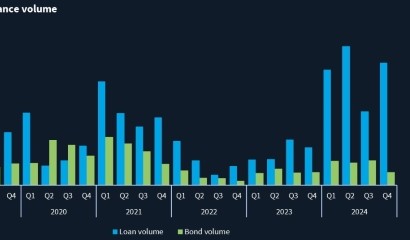CASE PROFILE: Consumer data company Dynata looks to shed USD 550m in debt under RSA with secured lenders
Dynata, a company focused on first-party data on consumers and business professionals, enters Chapter 11 with USD 31.5m in debtor-in-possession (DIP) financing and a restructuring support agreement (RSA) through which first and second lien lenders would exchange over USD 500m of funded debt for 100% of the equity in a reorganized company.
Dynata filed its Chapter 11 petition today (22 May) in the US Bankruptcy Court for the District of Delaware, reporting USD 1.43bn in total debt against USD 1bn to USD 10bn in assets. The company comes into the case with an RSA and DIP financing lined up, along with commitments for USD 50m in new money financing to support Dynata’s exit from bankruptcy. In addition to a debt-for-equity swap, the RSA contemplates that all of Dynata’s trade and other general unsecured creditors will receive full recoveries on their claims.
Dynata said it has already launched solicitation on a Chapter 11 plan that, because of the commitments of lenders signed onto the RSA to support the reorganization, will be accepted by all creditor classes. The company hopes to establish a formal deadline of 25 June for votes on the plan, followed by a 2 July hearing on confirmation of the plan and approval of the disclosure statement.
A first day hearing before Judge Thomas Horan has been scheduled for Thursday (23 May).
The company
Dynata is a global data platform company that focuses on providing business-to-business insights to market research firms, brands, media and advertising agencies, and investment firms, according to a first day declaration from Dynata’s CFO, Steven Macri. Generally, the company provides clients with data collection support through surveys circulated among members of a client’s loyalty program, or through online advertising, affiliate marketing and social media.
Among its offerings, Dynata touts a reach of more than 70 million consumers and business professionals across the globe, said Macri. The company serves more than 5,000 clients and produces more than 100 million surveys per year.
The company got its start in 1997 under a different name, Survey Sampling International. Another historical arm of the business, E-Rewards, launched in 1999 and was later renamed in 2014 to Research Now. The two sides of the business formally merged in 2017 and later, in 2019, rebranded with the new name Dynata, according to Macri. The company is based in Shelton, Connecticut.
Following the rebranding, Dynata embarked on multiple acquisitions between 2019 and 2022 that, Macri said, “greatly expanded and enhanced” the company’s operations. Over its time in business, Dynata has developed a sizable network of panelists who serve as participants in surveys the company facilitates on behalf of its clients.
“Clients can reach out to Dynata salespeople with specific inquiries,” said Macri. “For example, a client may want to survey 100 male left-handed golfers in Arizona to understand how this demographic will react to a specific product launch. The clients can provide Dynata with the exact survey they want to disseminate or Dynata can assist with writing or curating the survey. Dynata then is able to reach out to the applicable demographic of panelists and create a report of results for the client.”
Dynata also has several subsidiaries outside of the US, in places like Latin America, Europe, Asia, and Australia – Macri said that none of those foreign subsidiaries are debtors in the Chapter 11 case, however.
The debt
Dynata enters the Chapter 11 process with USD 1.27bn in funded secured debt, consisting of USD 96.9m under a first lien revolver, USD 920.77m under a first lien term loan, and USD 250m under a second lien term loan. Goldman Sachs Bank USA serves as administrative agent on the first lien loan facilities, while Acquiom Agency Services serves as administrative agent on the second lien term loan, according to court documents.
Dynata additionally reported USD 158.94m in “general operating” and other unsecured debt. The single largest unsecured claim is held by Cint USA Inc, owed USD 1.56m in trade debt, according to Dynata’s Chapter 11 petition.
The descent
As drivers of Dynata’s financial strains, Macri points to a combination of a market slowdown, the COVID-19 pandemic, interest rate changes and heightened competition in its sector.
Specifically, the CFO said market conditions that have led to a slowdown in merger and acquisition activity has “caused headwinds in the data intelligence industry,” as many of Dynata’s clients hire the company as part of the due diligence process for new deals. The pandemic, meanwhile, made it difficult for Dynata to grow and sustain its base of survey panelists. The company relied heavily on incentives in the form of air travel or hotel loyalty points to induce participation in surveys, and the slowdown in travel amid the pandemic put a damper on that approach.
As Dynata’s business faced a slowdown, it became clear that the company would not be able to keep up with its debt obligations unless it received relief from one or both of its first or second lien lenders, said Macri. The company faced a default under the first lien credit agreement in early February of this year, which in turn would have triggered a cross-default under the second lien credit agreement.
Facing those potential defaults, Dynata began discussions with two ad hoc groups: one consisting of first lien lenders organized with Gibson Dunn & Crutcher as legal counsel and PJT Partners as a financial advisor, and another consisting of second lien lenders organized with Vinson & Elkins as legal counsel and Lazard as a financial advisor. Those talks led to amendments agreed to on 6 February under both the first lien and second lien credit agreements.
As a condition of obtaining a grace period for defaults that could have occurred, Dynata committed to negotiating the terms of an RSA with the first lien group by the end of February, Macri said. That deadline was later extended, however, with the most recent expiration falling on Tuesday (21 May). The company and lenders ultimately did arrive at an RSA deal that now forms the basis of Dynata’s Chapter 11 case and plan.
The DIP, RSA and Chapter 11 case
Now under Chapter 11 protection, Dynata intends to pursue the restructuring transactions laid out in its RSA, with support along the way in the form of USD 31.5m in new money DIP financing from a group of first lien lenders. The lenders also have consented to Dynata’s accessing cash collateral during the Chapter 11 process. Dynata’s plan provides for its USD 31.5m DIP to convert to exit financing, with DIP lenders given the opportunity to participate in that exit loan, said Macri. Dynata has also lined up USD 50m in new money exit term loans.
Through the RSA and Chapter 11 plan based on that agreement, Dynata proposes to hand the majority of the equity in a reorganized company to its first lien lenders on account of their large debt holdings, with other equity to go to second lien lenders. Overall, the RSA and plan aim to trim Dynata’s funded debt down to approximately USD 780m from its current amount of nearly USD 1.3bn.
First lien lenders will be in line for 95% of the reorganized Dynata’s new common stock and a cash payment of USD 11.67m. Macri said that the amount of new equity flowing to Dynata’s first lien lenders would be subject to dilution from a proposed management incentive plan, but also could potentially be increased for first lien term loan lenders based on an option that the company intends to provide to first lien revolver lenders. Holders of the revolving loans could elect to receive their recovery in the form of holdings in a second out take back term loan rather than new equity.
The RSA and plan additionally provide for second lien lenders to receive the remaining 5% of equity in the reorganized Dynata, also subject to dilution from the management incentive plan. The second lien holders would also receive five-year warrants to purchase up to 12.5% of Dynata’s new common equity, and a USD 750,000 cash payment.
The plan would pay all holders of undisputed general unsecured claims in full, and existing equity holders would see their interests wiped out, Macri added.
The advisors



















